 The Huffington Post, May 29, 2010
The Huffington Post, May 29, 2010
Destroyed houses, tent camps, clouds of white phosphorous–these were just a few of the images of Gaza included in the video that accompanied Amnesty International’s annual human rights report, which was released yesterday.
The report covers 2009, including Operation Cast Lead, which began in late December 2008 and ended in January 2009. “Israeli forces committed war crimes and other serious breaches of international law in the Gaza Strip during [the] 22-day military offensive,” Amnesty states.
“Among other things, they carried out indiscriminate and disproportionate attacks against civilians, targeted and killed medical staff, used Palestinians as ‘human shields’, and indiscriminately fired white phosphorous over densely populated residential areas… Much of Gaza was razed to the ground, leaving vital infrastructure destroyed, the economy in ruins and thousands of Palestinians homeless.”
The report also faults Hamas for its behavior during Operation Cast Lead stating that the organization “continued to fire indiscriminate rockets and mortars into Israel, and within Gaza they abducted political opponents and former detainees alleged to have ‘collaborated’ with the Israeli intelligence services. Some were summarily killed; others were beaten or shot in the legs.”
Amnesty’s findings dovetail with those of the Goldstone Report, the UN commissioned inquiry which accused both Israel and Hamas with war crimes. The report also criticizes the fact that neither Israel nor Hamas has held “credible investigations” regarding atrocities committed during Operation Cast Lead.
And if Israel and Hamas continue to refuse to investigate the allegations against them, they will be referred to the International Criminal Court, said Itai Epstein, Director of Amnesty International’s Israel section, speaking at Wednesday’s press conference for the report.
The Amnesty report contains sharp words for Israel in respect to its ongoing blockade of the Gaza Strip, which began in June 2007 after Hamas came to power in Gaza. The siege, Amnesty says, “deepened the ongoing humanitarian crisis. Mass unemployment, extreme poverty, food insecurity and food price rises caused by shortages left four out of five Gazans dependent on humanitarian aid. The scope of the blockade and statements made by Israeli officials about its purpose showed that it was being imposed as a form of collective punishment of Gazans, a flagrant violation of international law.”
According to Amnesty, Operation Cast Lead has brought the impact of the siege to “catastrophic levels” by destroying infrastructure which now cannot be rebuilt due to the blockade.
“As a result, there was a further deterioration of water and sanitation services; more power cuts, causing severe problems in the summer heat and for public and health institutions; greater overcrowding in schools; more challenges for an already overstretched health system struggling with damaged facilities and higher demand; and little or no chance of economic recovery. Israel continued to deny farmers access to their land within 500m of the Gaza-Israel border, and to ban fishing further than three nautical miles from the shore,” the report states.
At yesterday’s press conference, Amnesty emphasized that Hamas has been largely unaffected by the blockade and that the hardest hit were vulnerable populations like children, the elderly, the homeless, and the sick. The siege prevents medical facilities in Gaza from functioning properly; it also prevents the ill from getting help elsewhere.
The report also sheds light on Israel’s harsh treatment of West Bank Palestinians.
The Israeli-constructed separation barrier severs Palestinians “from their land, jobs, and relatives,” Amnesty says. Curfews, checkpoints and roadblocks also hinder access to schools and healthcare facilities.
Palestinians in the West Bank also suffer from a lack of running water, according to Amnesty.
“Israel continued to deny Palestinians in the OPT [Occupied Palestinian Territories] far access to adequate, safe water supplies, hindering social and economic development and posing threats to health, in violation of its responsibilities as the occupying power. Palestinian water consumption barely reached 70 liters a day per person–well below the WHO’s [World Health Organization] recommended daily minimum of 100 liters.”
Epstein pointed out that the West Bank’s Jewish settlers get four times the amount of water per capita than Palestinians in the same area.
There is trouble within Israel’s borders, as well.
“Israeli forces forcibly evicted Palestinians and demolished their homes, particularly in East Jerusalem, on the grounds that the buildings lacked permits. Such permits are systematically denied to Palestinians. Simultaneously, Israeli settlements were allowed to expand on illegally confiscated Palestinian land. The Bedouin population of the Negev was also targeted for forced evictions,” the report states.
Serious concerns about Israel’s treatment of African refugees were voiced at the press conference. Campaigns and Activism Director Oded Diner criticized Israel’s policy of hot returns, the recently-debated Infiltration Prevention Bill, imprisonment of unaccompanied minors, and the fact that refugees from Sudan and Eritrea are routinely deprived of refugee status.
Photo: AP/Khalil Hamra